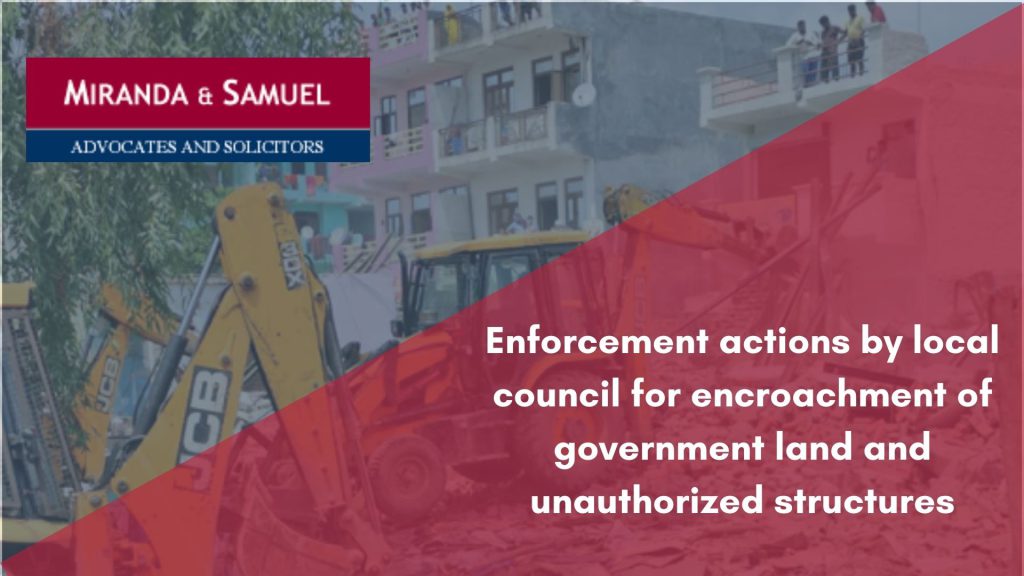There appears to be more local council enforcement actions. Demolition of structures will delay, disrupt, and even derail development activities.
According to the Uniform Building By-Laws of the Street, Drainage and Building Act 1974 (the SDB Act), developers are required to first obtain a Building Plan or Temporarily Building Permit prior to the commencement of construction work on site. This is to ensure that the construction strictly complies with the building laws and regulations, thereby fostering a safe and healthy living environment. Failure to obtain the required permit before the construction may result in the developer committing an offence under the law, the construction being stopped and even demolition of the building by the local authority.
It’s useful to note that under the SDB Act, the definition of developer includes a party providing monies for development and buildings.
Who is a developer?
Section 3 of the Street, Drainage and Building Act 1974
“any person, body of persons, company, firm or society who or which engages in or carries on or undertakes the business of developing or providing monies for development or purchasing or partly developing and providing monies for purchasing buildings;”
Local Council enforcement for encroachment on government land
In May 2023, an illegal corner unit located in Jalan Gempita 3 was demolished by the Dewan Bandaraya Kuala Lumpur (DBKL) as it violated the Uniform Building By-Laws of the Street, Drainage and Building Act 1974 by erecting on government reserve land. Although a permit was obtained in June 2022 for a two-storey residential unit to be built, the owner encroached onto public drains and road reserve in the area during the construction. Numerous complaints were lodged by the residents worrying about their safety as the premises were located adjacent to residential homes. Thus, a stop-work order was issued by the DBKL but this was ignored by the owner and the owner resumed construction to build a warehouse. The Federal Territories Land and Mines Office (PTGWP) confirmed that the owner had no permit or temporary occupation license and was trespassing on the government land. DBKL caried out enforcement actions by demolishing the warehouse.
Local council enforcement for unauthorised temporary structures
DBKL carried out a demolition of unauthorised temporary structures situated at Lot 63, No. 19A, Jalan Titiwangsa, Taman Tasik Titiwangsa in January 2024. DBKL stated that marquee tent structures and the ongoing permanent toilet construction work which have been set up at the site violated Section 19 and Section 26(1)(b) of the Federal Territory (Planning) Act 1982 (Act 267) (FTP Act)
Section 19 of the Federal Territory (Planning) Act 1982 provides that:
“(1) Subject to the provisions of this Act no person shall use or permit to be used any land or building or commence, undertake or carry out any development otherwise than in conformity with the development plan or any planning permission granted under this Act in respect of the development.
Section 21(1) of the Federal Territory (Planning) Act 1982 (Act 267) further provides that any person who “(a) commences, undertakes or carries out development in contravention of subsection 19(1) or uses or permits to be used any land in contravention of that section;
… is guilty of an offence and on conviction is liable to a fine not exceeding fifty thousand ringgits and in the case of a continuing offence to a further fine which may extend to five hundred ringgits for every day during which the offence continues after conviction for the first commission of the offence.”
On the facts, the land and the bungalow belonged to the Federal Land Commissioner (PTP) under the purview of the Prime Minister’s Department, Property Management Division (BPH JPM). The property was then leased to the Malay Journalists Association (PWM) as an office. While the site is only for residential use, marquee tent structures were set up at the site for the purpose of a wedding business, and advertisements were put on the site’s fence to invite people to ‘Book Wedding Packages’ and ‘Book Various Events’.
PWM’s application to change the land to commercial status was rejected during the Local Central Committee Meeting 1 (OSC 1) as the site is reserved in the City Plan 2020 (PBRKL 2020) and business activities would cause disturbance to the surrounding residents. Also, it is stated by BPH JPM that all tenants had been notified of the requirement to obtain permission from the local authority before the commencement of any constructions or activities on the premises. However, despite a series of verbal warnings and notices, it was reported that, PWM did not make the required effort to remove the unauthorised marquee tent structures and permanent toilet construction works. As such, DBKL, relying on the FTP Act, caried out enforcement actions by demolishing the structures.
Key takeaway
1. There appears to be more local council enforcement actions, relying on the SDB Act and the FTP Act. Demolition of structures will delay, disrupt, and even derail development activities.
Despite being the registered owner of the land, developers still need to obtain a construction permit from the local state authority before the commencement of construction work on site. It is important to ensure the safe design and construction of the intended building. Additionally, the developers are advised not to encroach on government land, for example, public drains and road reserve, which may lead to demolition by the state local council.
2. Changing the status of the land from residential to commercial may be challenging as the state local council may not approve such alterations due to the potential disturbance that business activities could cause to the surrounding residents. Developers are advised to always check the land status carefully, and get legal advice on the likelihood of the change of status being approved, before purchase or if already purchased, before commencing construction.
–
By George Miranda , Joy Sam Jia Qian, Kong Chai Yin
This article is for general information purposes only and does not constitute legal or professional advice. It should not be used as a substitute for legal advice relating to your particular circumstances. Please note that the law may have changed since the date of this article.





